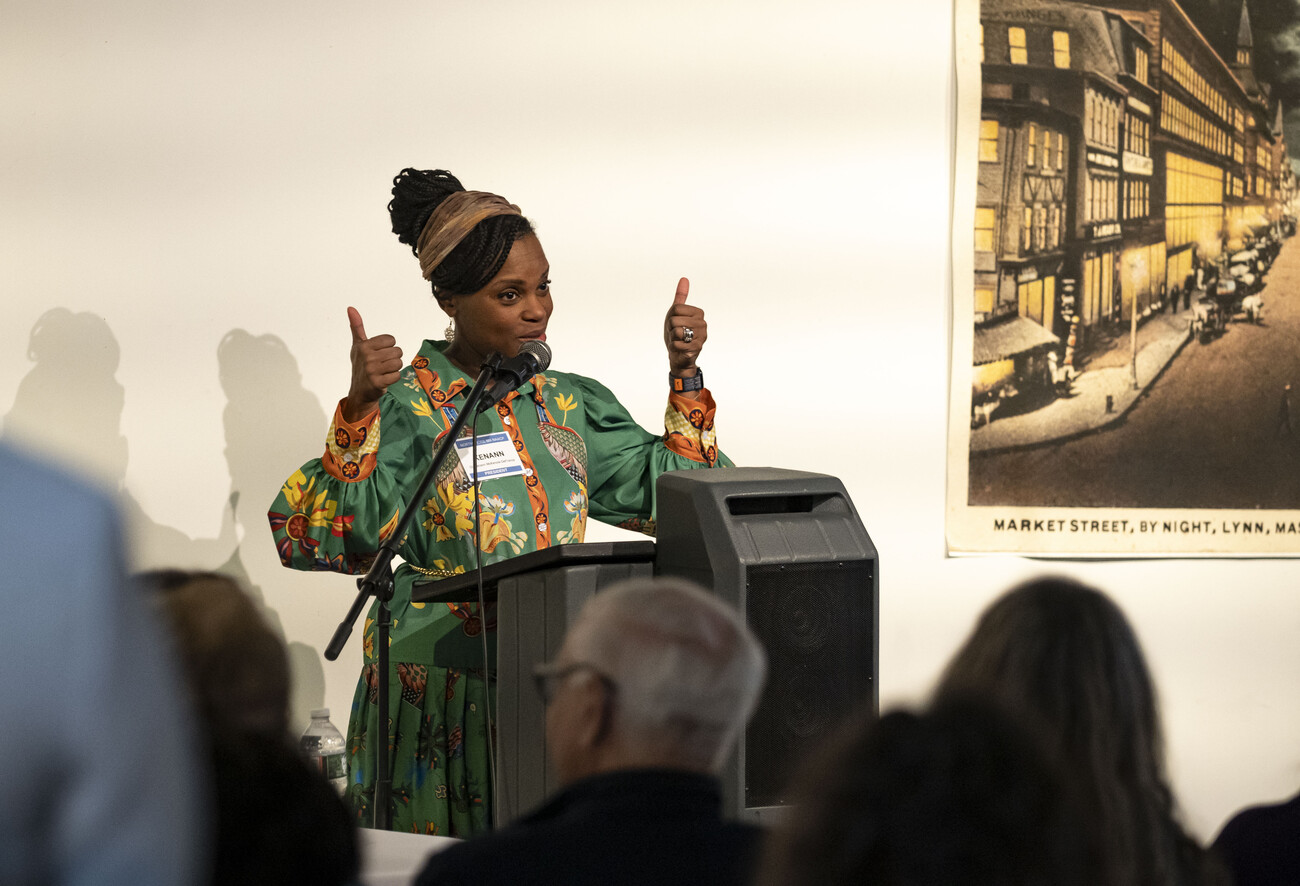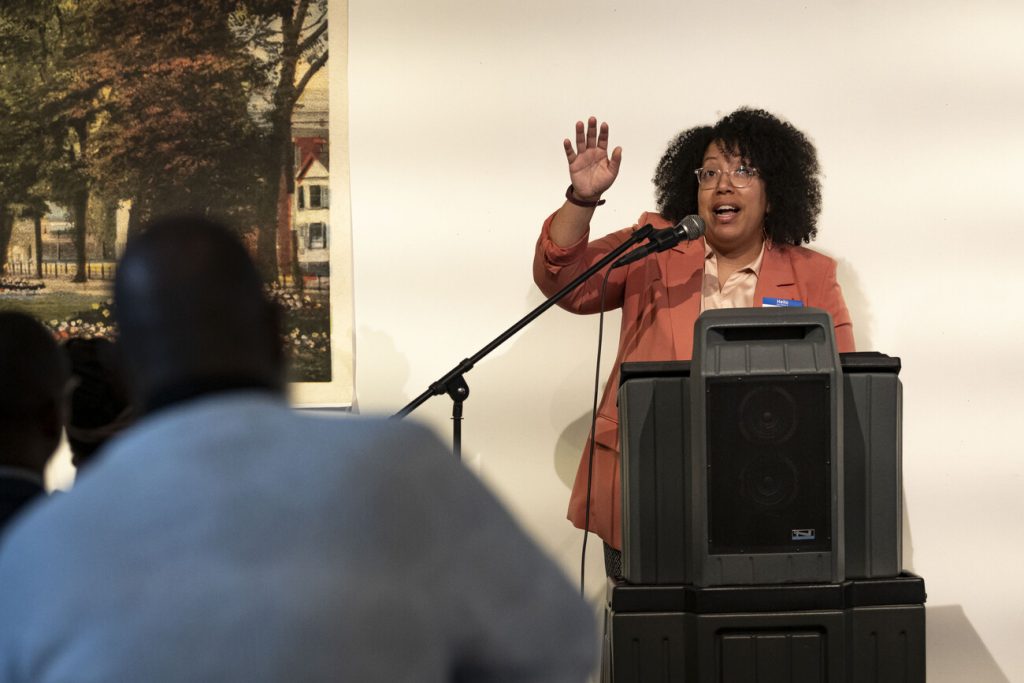

LYNN — The NAACP (National Association for the Advancement of Colored People), North Shore Branch, held its first State of the North Shore Symposium Saturday at Lynn Museum and Cultural Arts.

The Symposium included welcome remarks from President Kenann McKenzie-DeFranza, information regarding the museum from Executive Director Doneeca Thurston-Chavez, playing of the Black National Anthem, advocacy area presentations, a panel discussion, and closing remarks by President and CEO of Massachusetts League of Community Health Centers Michael Curry.
The advocacy area presentations included four guest speakers, who discussed the work being done in the area, broken down into four parts: history, housing, education and justice system, and healthcare. Speakers included History Chair Lauren McCormack, Rachel Heller of CHAPA (Citizens’ Housing & Planning Association), District Attorney Paul Tucker, and Dr. Carlos Cappas from the Lynn Community Health Center (LCHC).
“We are now at a critical point in Massachusetts. We have a lot of tools … and we need to decide, will we use these tools to put ourselves on a path to a brighter future for everyone?” Heller said. “Or, will we continue the status quo, and will we continue to ignore the realities of the harms in our policies in government?”

During Heller’s presentation, she discussed the importance of people getting involved in local government and public meetings.
“It really is up to all of us to be getting out there, to participate as much as we can. We need to show up, and it’s not just show up. We need to speak up,” Heller said. “It really is important to weigh in and to change the conversation.”
Heller closed her presentation saying the need to allow housing diversity, increase home ownership, and have goals in people’s communities about where they want to be and how they’re going to get there.
Tucker discussed the correlation between education and the justice system, and the importance of the right form of discipline for students. He also said he spent more than half his life as a police officer.
“It’s important to me, having had a long career in policing, to sometimes recognize when you got it wrong. I think we got it wrong a lot of times (in policing),” Tucker said.

Tucker discussed how he’s made strides to bring in mental healthcare workers with the police, “not to replace police officers, but to complement the work they’re doing.”
“I know, in Boston, there’s at least been a couple of cases where families call for help, because, a mental health issue among a family member. And I know of at least two cases where deadly force was used,” Tucker said. “And in both cases the family members said, ‘we called for help. This is not what we called for.’”
He explained that the school-to-prison pipeline is caused by punishment-based approaches, such as zero tolerance policies put in place in schools, unnecessary arrests for school violations, missing social and emotional challenges kids are facing in schools, and the lack of resources particularly for low-income students and students of color.
“A 14-year-old was found with a machete in his backpack. Now, on the face of that, it sounds really bad. Sounds dangerous. And it is. But, once we dug a little bit deeper, we find out why that student had a machete in his backpack. We find out that it was given to him by a family member who said, ‘you need this to protect yourself’ because he was being groomed by a gang and he didn’t want to join. That changes things,” Tucker said. “When digging even a little deeper, we found that this student was an excellent student. But over the last few weeks before he was found to have a machete, there was a drop. There was a dip in his grades, attendance.”
In Tucker’s office, they made the decision to not charge the student, made sure he got services, talked to the school department, and got him back in school.
Tucker actively works on bringing social workers into law enforcement, transgender protection, and prison reform, specifically focusing on solitary confinement reform.
Cappas talked about the disparity when it comes to healthcare in his presentation, discussing how he and his team are working to address the issue of lack of services and comprehensive care.
He said the LCHC is in 16 public schools, allowing physical care to be offered on school premises for students at all times.
Finally, Curry tied off the symposium with his closing remarks. Curry has been a full-time volunteer for years, and actively gives presentations titled “the Quantum Leap,” where he “walks through the history of racism,” in the country, starting from 1619.
“So, for two to three hours, believe it or not, I quantum leap back and forth in time, connecting the dots to why we won’t take the vaccine, why we’re mass incarcerated, why we don’t trust, why we’re disparately unemployed, unhoused, unbanked, and I connect that history,” Curry said.
He continued, emphasizing the importance to look back at history, to understand the present.
“By the time I talk to you about economic disparities, and that some people don’t have wealth, you don’t think that’s because they don’t pull up their pants and they don’t want a house. … I need you to understand the history of the country so that when we sit down and have a conversation, I don’t start at a deficit,” Curry said.
Curry ended the speech thanking everyone for the symposium.
24World Media does not take any responsibility of the information you see on this page. The content this page contains is from independent third-party content provider. If you have any concerns regarding the content, please free to write us here: contact@24worldmedia.com

Common Mistakes When Using Athletic Field Tarps

High-Performance Diesel Truck Upgrades You Should Consider

Warehouse Optimization Tips To Improve Performance

Fire Hazards in Daily Life: The Most Common Ignition Sources

Yellowstone’s Wolves: A Debate Over Their Role in the Park’s Ecosystem

Earth Day 2024: A Look at 3 Places Adapting Quickly to Fight Climate Change

Millions of Girls in Africa Will Miss HPV Shots After Merck Production Problem

This Lava Tube in Saudi Arabia Has Been a Human Refuge for 7,000 Years

Four Wild Ways to Save the Koala (That Just Might Work)

National Academy Asks Court to Strip Sackler Name From Endowment

Ways Industrial Copper Helps Energy Production

The Ins and Out of Industrial Conveyor Belts